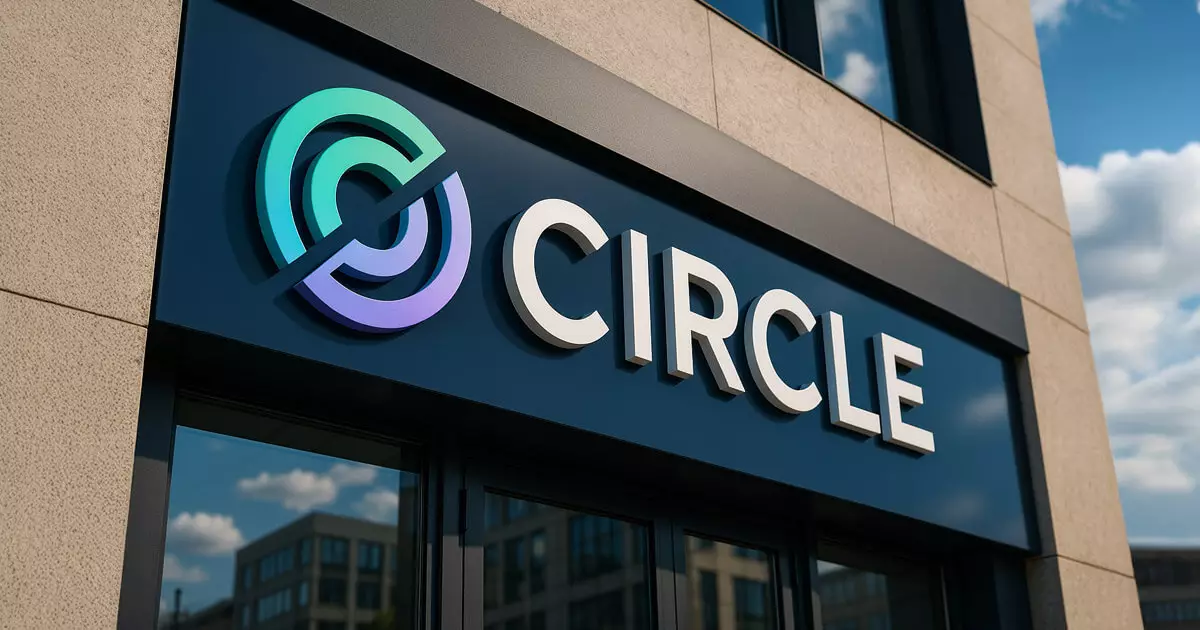As the cryptocurrency sector continues to redefine financial paradigms, Circle, the issuer of the USDC stablecoin, is signaling a pivotal shift in its trajectory. Recent reports indicate that Circle is advancing its plans for an initial public offering (IPO), eyeing a valuation of approximately $5 billion. While the prospect of going public is always an exciting prospect for any tech company, Circle’s flirtation with acquisition talks with industry giants like Coinbase and Ripple is an intriguing subplot that merits closer examination.
Why should we care about Circle’s maneuvers? For one, Circle’s potential IPO not only signifies its growth but also reflects a surge in legitimacy that the crypto space has long craved. Despite occasional volatility in the market, having a company as central to the crypto ecosystem as Circle listing publicly could symbolize a maturing industry. However, it’s crucial to analyze whether an IPO would be better for Circle—or whether throwing in its lot with an established player like Coinbase is the wiser gamble.
The Coinbase Connection: A Complicated Relationship
It’s hard to ignore the historical ties between Circle and Coinbase, which serve as both a blessing and a curse. The two entities co-founded the USDC stablecoin through the Centre Consortium, an arrangement that granted them equal governance over the initiative. However, that partnership dissolved in 2023, leading to Circle’s dominance over USDC governance. This major shift has positioned Coinbase as more of an ally than a potential competitor.
Given Coinbase’s close connection to Circle’s ecosystem, one can’t help but wonder if their trajectories are inextricably linked. For instance, while Circle maintains control of USDC, Coinbase benefits significantly through a revenue-sharing agreement, with Coinbase earning 100% revenue from USDC held on its platform. This arrangement illustrates a codependency that makes it more challenging for Circle to venture into new partnerships without Coinbase’s approval. If Circle is indeed seeking a buyer, Coinbase appears logically and strategically positioned to follow through. The stakes are high, and it seems that if Coinbase were to show interest, Circle would likely accept the offer without hesitation.
Ripple’s Ambitious Bid: A Case of Too Little, Too Late?
Interestingly, Circle also received a proposition from Ripple Labs with a valuation between $4 billion and $5 billion. However, Circle turned down this offer, calling it insufficient. This raises questions: was Ripple simply too late to the table with an offer lacking the allure of Coinbase’s potential partnership? Ripple has made waves in the market with its recent acquisitions, including its hefty $1.25 billion purchase of Hidden Road. However, the competitive landscape suggests that its growth trajectory may not be as well-aligned with Circle’s potential strategic goals.
Ripple’s assets, particularly its extensive XRP holdings, would seem to offer significant liquidity and promise. Yet, the complicated dynamics surrounding Ripple—including its ongoing legal struggles with the SEC—may dissuade Circle from associating with them. The crypto community has fluctuated significantly in its regard for Ripple, with its involvement in controversial dealings casting a long shadow over potential partnerships.
Strategic Advantages of an IPO vs. Acquisition
Consider the implications of an IPO versus aligning with established players like Coinbase or Ripple. A public offering could allow Circle to harness capital for expansion, research, and development, positioning itself at the forefront of innovation in digital finance. However, the crux of the issue remains: would entering the public market expose Circle to unforeseen challenges, such as regulatory scrutiny or market volatility?
On the flip side, merging with a robust platform like Coinbase could provide Circle with unparalleled market access and liquidity. The advantages of gaining a larger share of operational efficiency and eliminating unnecessary friction in their existing partnership can be tempting. Nevertheless, relinquishing some level of autonomy could prove to be a bitter pill for Circle to swallow.
In a rapidly evolving sector, with competition and consolidation at every corner, the future of Circle hinges on its next strategic moves. Whether it chooses to go public or aligns with a larger player remains to be seen, but one thing is certain: the decisions made in the coming months will reverberate throughout the crypto world.

